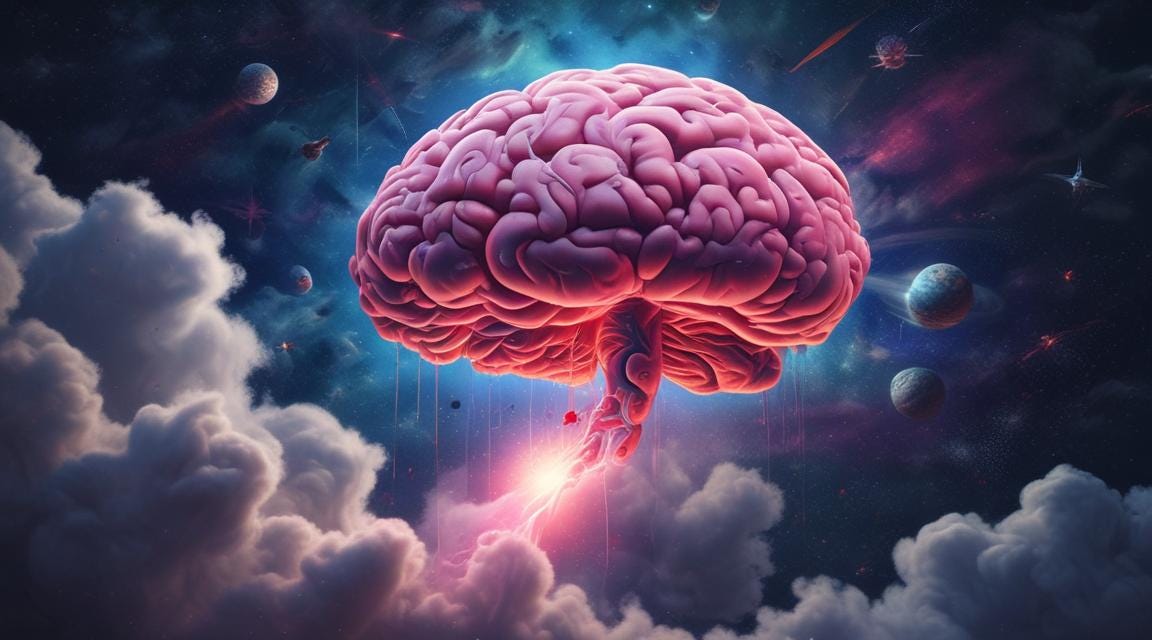The Atheist/Naturalist Account of Consciousness is Very Implausible
The idea that physical matter can be conscious leads to some very weird places.
Since atheists don’t believe in anything like a soul, they have to believe that all of our conscious experience is produced by our brains, and all of your experiences are ultimately just atoms bouncing around. This position is sometimes called Physicalism. One alternative view is Dualism, which posits that we have physical bodies, but that the mind is distinct from the physical body. Another view (sometimes called Idealism) is that only minds exist and the physical world is an illusion.
Some atheists believe that “consciousness is just information processing” by which they mean that any system which processes sufficiently complex information will necessarily be conscious. That system could be a brain, a computer, or some other kind of system. The idea that brains cause consciousness sounds common sensical, but it leads to some very implausible conclusions.
The Conscious Game Board
Suppose that you made a game board with as many squares as there are neurons in a human brain. You could place pawns on the board and move the pawns around according to certain rules. You could construct the rules so that the motion of the pawns would behave like neuron firings in a human brain. There could be a one to one relationship in which each board game square corresponds to one neuron, a square with a pawn on it corresponds to a neuron which is firing and a square without a pawn on it corresponds to a neuron which is not firing.
It would seem that the atheist naturalist would have to conclude that the board game is conscious After all, the board game is processing as much information as a human brain would process. And this is not a fantasy scenario. There are about 100 billion neurons in the human brain. With one square inch per square, you would need dimensions of about 316,000 squares by 316,000 squares to get 100 billion squares total. 316,000 inches is 5 miles, so the total area of the game board would be 25 square miles. There are individual ranchers in Montana who have enough land to host such a game board.
But the idea that a game board is conscious seems absurd. If the theory that brains cause consciousness implies that game boards can also be conscious, we should doubt that brains cause consciousness.
Boltzmann Brains
There is a hypothesis in modern physics that entropy will increase until all the matter in the universe is spread out across a vast space, at which point the universe will remain in that state forever. At that point, there is a nonzero probability, no matter how tiny, that the bits of material floating in the universe could come together just by chance to create a bicycle, a house, or even a brain. Most brains created in this way would have experiences like random static, or would have inconsistent memories, but some fraction of the brains would have consistent memories and intelligible experiences just as if they were in the bodies of creatures like ourselves, living real lives.
The fact that you have consistent memories and intelligible experiences – rather than static – is a piece of evidence that you are a real embodied creature, not a Boltzmann brain (because the odds of intelligible experience rather than static is very high on the real embodied creature hypothesis and very low on the Boltzmann brain hypothesis). But that piece of evidence is overwhelmed by the base rate. If the universe continues to exist forever, the number of Boltzmann brains will be practically infinite, so even the small subset of Boltzmann brains which happen to have consistent memories and intelligible experiences will vastly outnumber all of the real embodied creatures who ever lived. The atheist naturalist has to conclude that he is probably a Boltzmann brain.
Moreover, the possibility of a Boltzmann brain undermines your basis for believing anything about neurology or physics in the first place. If you really were a brain floating in outer space, then your memory of reading about physics in a book must be a fake memory. The odds would be overwhelmingly likely that the theory of physics which you remember reading in a book would be a false theory.
In other words, if you believe that brains cause consciousness and you discover that your theory of physics implies that Boltzmann brains will exist, then your theory of physics is almost certainly wrong, because the theory is self-defeating; if the theory were true then you would almost certainly be a Boltzmann brain, and so all of the evidence that you thought you had for your best theory of physics would actually be worthless non-evidence. Dualists and Idealists don’t have this problem because they don’t need to believe that the brain causes consciousness.
Key Takeaways:
The position that the brain causes consciousness seems to imply that certain board games must be conscious.
If our best understanding of physics implies that Boltzmann brains will exist, that’s a huge problem for naturalists/materialists, but not a problem at all for Dualists and Idealists.






Not sure why a physicalist would be repulsed by the conscious board game. It seems like an easier pill to swallow than saying a room or China itself could be conscious
The Boltzmann brain concept seems flawed to me. The frequency at which random bits come together to form any complex object in a particular region in space is directly related to the density D of the bits in that region (more bits means more chances of collision in that volume). The volumetric rate of coming together of N bits to form a complex object like a Boltzman brain is then proportional to D^N. The density is proportional to the total matter in the universe M divided by the volume of the universe V. The volumetric rate then becomes
rate/vol = K' * M^N / V^N where K' is the constant of proportionality
The total rate over a universe of size V is the above expression multiplied by V or
total rate [K' * M^N] / V^(N-1) = K * V^(1-N) where K = K'*M^N
Let v be the expansion rate (distance v per time) of the universe from the big bang at t = 0, then the volume of the universe at time t would be V = 4/3 PI * (vt)^3
Putting this into the expression for total rate yields
total rate = K * [(4/3 PI v^3]^(1-N)] * t^(3 -3N)
The quantity in brackets is constant for a given value of complexity (N). This is multiplied by another constant K to give the new constant G for a given complexity N and the total rate becomes
total rate = G * t^(3-3N)
As time t rises the frequency of collisions falls, which make sense as the bits become ever further apart and less likely to ever meet.
But as time goes on we have more time for such collisions to happen. To get an idea of how many collisions can happen we multiply the rate by time to get the total expected number EN or
EN = G * t^(4 - 3N)
For N = 2 we have EN = G * t^-2.
As t goes to infinity, the expected number goes to 0 as the square of time. For N larger than 2 the number falls to zero more rapidly. For N in the quadrillions as expected for atoms forming into a brain, the number falls to zero almost instantly. Only in the very early existence of the universe could any brains form after which, given the very high temperatures present then they would fly apart and cease to exist. Therefore the number of Boltzman brains in the universe would be vanishingly close to zero.
Hence it is extremely unlikely we are Boltzman brains.